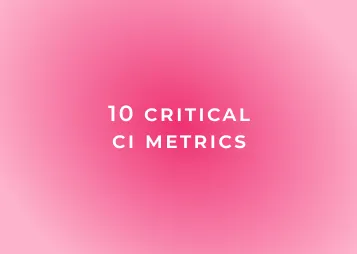Sales teams thrive when they spend the majority of their time in their CRM.
The most successful sales and revenue teams I see are the ones which view their CRM not just as a database but a dynamic tool to drive smarter, more informed decisions. The more data your team has at their fingertips - especially from their customer interactions - the faster they can act and the better their results will be.
Conversation intelligence metrics go beyond simply recording calls; they capture the nuances that drive deals forward. Embedding these metrics directly into your CRM via a conversation intelligence platform means your team doesn’t need to toggle between platforms to access the data they need. This consolidation ensures that every decision - whether about a specific deal, competitive positioning, or overall strategy - is based on solid, real-time insights.
Here are the ten essential conversation intelligence metrics I believe should live in your CRM, each with the potential to boost revenue and optimize team performance.
1. Number of sales conversations by rep
Tracking the number of sales conversations each rep holds is foundational. This metric gives you a clear picture of how active each team member is. Low conversation numbers could indicate that a rep is struggling to build a pipeline, while high numbers with few conversions may highlight a quality issue.
Why it matters: Volume matters in sales. If your CRM highlights a decline in a rep’s activity, it’s an early sign that their pipeline may dry up, and you can intervene proactively.
2. Conversation stats by rep
Conversation stats offer deeper insight into the quality of your team’s engagements. Metrics like talking speed, question rate, and how often a rep dominates the conversation can indicate whether they’re conducting productive dialogues or just talking at prospects. Balanced, two-way conversations are key to building trust and uncovering needs.
Why it matters: Sales performance isn't just about the number of conversations but the quality of those interactions. Tracking these in your CRM helps coach reps to ask more open-ended questions, maintain a healthy talk-to-listen ratio, and adjust their pacing. Meanwhile, as a manager you can QA at scale and replicate business-winning behaviours across your growing team.

3. Most active deals
Not all deals are created equal, and some demand more engagement than others. The most active deals, measured by the number of interactions, help identify where your team’s attention is focused. High interaction counts could indicate a hot deal nearing closure or a complex opportunity that needs more nurturing.
Why it matters: Knowing where the bulk of activity is concentrated allows sales leaders to prioritize sales coaching and resources to close those critical deals faster.
4. Open competitive opportunities
In competitive markets, knowing which opportunities are facing stiff competition can shape your team’s strategy. Tracking open deals where competitors have been mentioned within your CRM gives you and your reps the upper hand in planning tactics that address specific challenges posed by rivals.
Why it matters: Competitive insights empower your team to tailor pitches, highlight differentiation, and move quickly to stay ahead. It also offers sales leadership a real-time view of the competitive landscape.
5. Lost competitive opportunities
As valuable as it is to track open opportunities, understanding where you’ve lost to competitors is crucial for improving your team’s strategy. By embedding this metric into your CRM, you can analyze patterns, learning which competitors are consistently winning and more importantly - why.
Why it matters: What you learn from lost deals can be game-changing. Identifying trends in lost competitive opportunities enables more effective battle cards and sales frameworks, helping your team turn future losses into wins.
6. Won competitive opportunities
On the flip side, tracking won competitive opportunities lets your team see where they’re excelling. It provides insights into what’s working in head-to-head competition, whether it’s a particular feature, pricing model, or sales technique.
Why it matters: Reps can replicate successful strategies across similar deals, and managers can double down on training that’s clearly delivering results.
7. Win/loss analysis by competitor
Win/loss analysis is a powerful tool to understand both strengths and weaknesses in your sales approach and keep an eye on the state of the market. By having this information automatically logged in your CRM, you can continually refine your approach, learning from each win and each loss and nailing your GTM strategy.
Why it matters: This level of analysis helps sharpen competitive positioning, arm reps with relevant insights during competitive deals, and ultimately increase win rates.

8. Most common triggers against won and lost deals
Every deal has topics and triggers that can either push it forward or cause it to stall. Whether it's pricing concerns, product fit or timing, tracking the most common triggers via conversation intelligence helps your team anticipate challenges before they arise.
Why it matters: Recognizing patterns of triggers associated with won and lost deals helps sales teams refine their strategies, preparing them to handle objections more effectively.
9. Most common topics by theme
The ability to categorize conversations by theme - be it pricing, product concerns, or timelines - is invaluable for sales teams. Knowing the most common themes in your CRM on a weekly basis allows managers to spot trends and adjust messaging to stay relevant.
Why it matters: When you can align your sales strategy with the hottest topics of the week, your team stays agile and can respond to shifting buyer priorities in real time.
10. Late-stage deals with no pricing cited
One of the most dangerous red flags in late-stage deals is the absence of pricing discussions. If a deal is nearing the final stage without any mention of cost, it suggests that critical objections may not have been handled, or the prospect isn’t serious about buying. If you as a manager are going to intervene in any deals this week, let it be these.
Why it matters: Monitoring late-stage deals with no pricing in your CRM ensures that you and your team can take swift action to address pricing conversations, preventing stalls and increasing the likelihood of closing.
The power of conversation intelligence in your CRM
When your conversation intelligence metrics live directly in your CRM, your sales team gets the full picture without switching platforms. Jiminny's Salesforce App allows these metrics to be sent directly to your CRM automatically, so there are ready for you to review. Seamless CRM integration saves time, enhances productivity, and delivers critical insights at just the right moment. By keeping these ten key metrics top-of-mind in your CRM, your team can operate smarter, act faster, and close more deals.
Want to find out more about the conversation intelligence insights Jiminny could provide your team? Book a 30-minute demo here.
Tom Lavery is the CEO and Co-Founder of Jiminny, the leading conversation intelligence and sales coaching platform that helps companies maximize their revenue. With over 15 years of experience in high-growth VC/PE-backed SaaS companies, Tom was previously SVP at Reward Gateway, now sharing his wealth of knowledge as a speaker in the conversation intelligence space.





.webp)






